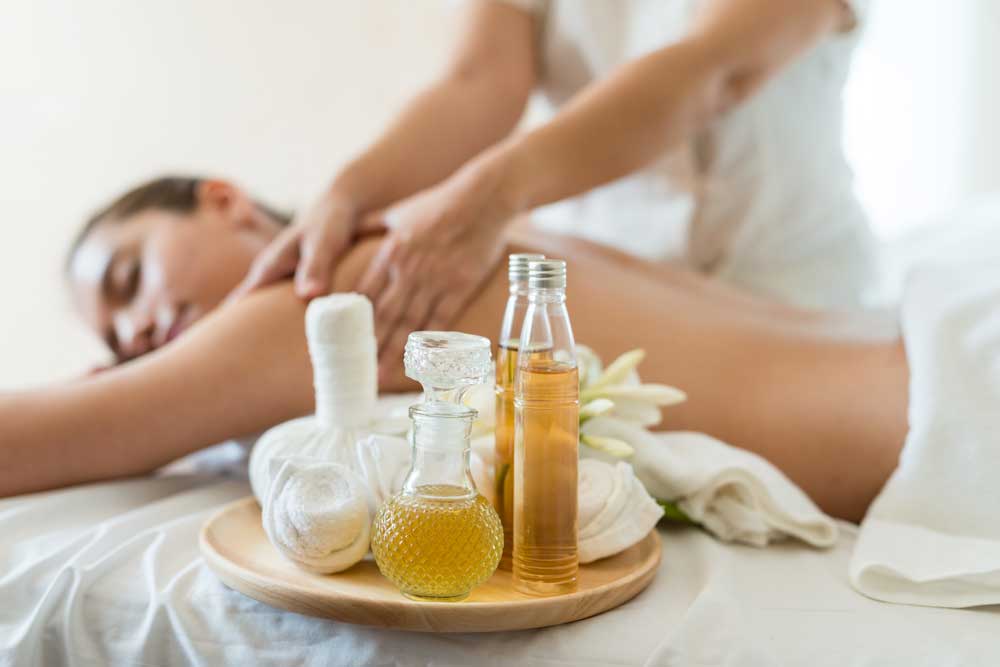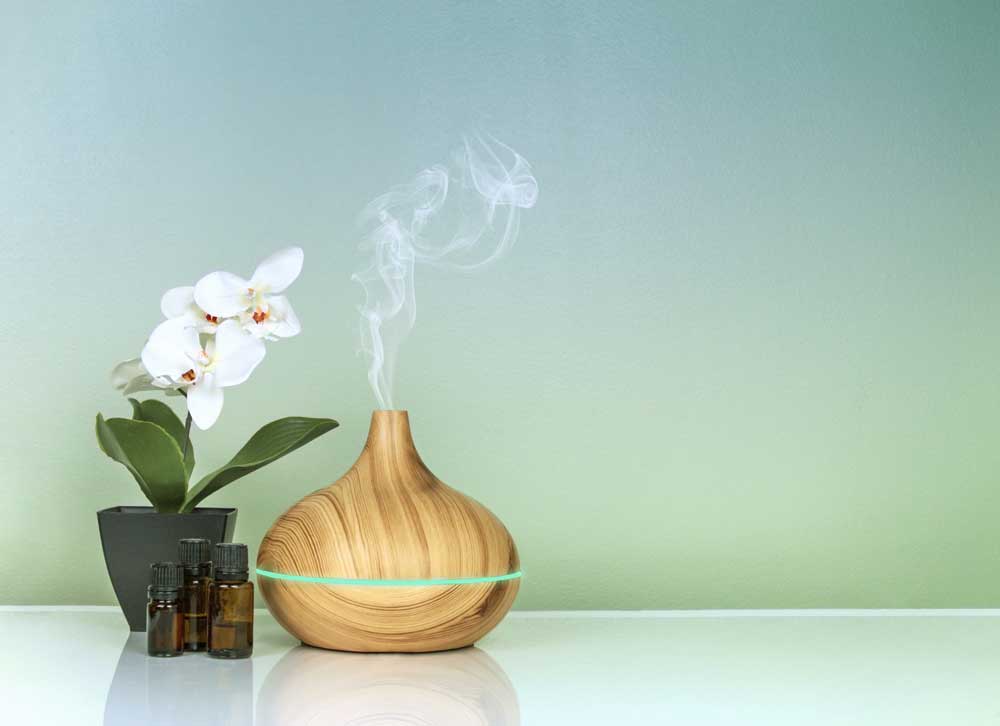Last Updated on 3 years ago by Nicky Johnson
Never underestimate the power of your sense of smell, as certain fragrances or scents could help you relax and sleep better. This is called aromatherapy. You probably had an experience where you’re simply loving the scent of a perfume or flower and feeling so good. This similar feeling is what aromatherapy aims to unleash to help people sleep better.
In this article, you’d learn more about aromatherapy—from lavender pillow to essential oils—and how it could help you sleep better.
What Is Aromatherapy?
Aromatherapy or essential oil therapy refers to a holistic treatment to enhance physical, mental, and even spiritual health by using natural plant extracts from herbs, flowers, or trees. This holistic approach appears to have become popular in science and medicine today. But how is this treatment helpful in attaining better sleep?
How Lavender Pillow Could Help You Sleep Better
Blog Contents

Lavender is known for its beautiful color and captivating sweet scent. It’s believed to have healing effects and has been used since ancient times as a treatment for various ailments. This includes anxiety, headaches, depression, nausea, toothache, acne and other skin problems, insomnia, and even mental health conditions.
Nowadays, lavender is a popular essential oil used in aromatherapy and as buds for lavender aromatherapy pillows. It’s claimed that lavender could help alleviate stress and anxiety, reduce migraine headaches, and improve sleep quality.
What Is A Lavender Pillow?
A lavender pillow is a type of aromatherapy pillow that contains soothing dried lavender buds and buckwheat hulls. Whether you’re planning an afternoon nap or a good night’s sleep, a lavender pillow would provide a sweet herb scent that could help you attain this goal.
Good Qualities Of Lavender Pillows
Pillow manufacturers have apparently discovered the great benefits of lavender when combined with other pillow materials. Dried lavender leaves stuffed in pillows seem to be gaining popularity. They’re said to help promote comfort and relaxation because of the lavender scent, which could make people fall asleep faster.
Generally, the scent of aromatherapy buckwheat lavender pillows lasts for a year. The constant movement of buckwheat hulls against the lavender buds every time you move your head releases the lavender scent.
With the dense, breathable material of buckwheat hulls and the fragrant scent of lavender, the two are believed to make a perfect combination as a natural sleep aid. But what do you need to look for when buying lavender pillows?
Excellent quality lavender pillows in the market are thought to have the following qualities:
- Durable: Premium quality aromatherapy lavender pillows come with durable pillowcases made of leak-proof cotton.
- Easy to use: You’d find a lavender pillow that’s ready to use once you unpack it. It means you wouldn’t need an extra pillowcase. You could easily add or remove buckwheat hulls and lavender buds filling on both the outer and inner pillowcase through the zippers.
- Filled with organic buckwheat hulls: Buckwheat hulls appear to be favored for manufacturing pillows because they’re a natural material. Pillows made of organic buckwheat hulls are known to not attract pests or retain heat.
How Essential Oils Could Help You Sleep Better

Aromatherapy is incomplete without essential oils. Exposing yourself to scents associated with calmness, relaxation, comfort, and positive mood may be beneficial before bedtime. Because stress and anxiety tend to contribute to sleeping problems such as insomnia, aromatherapy could help divert and convert the negative feelings into something positive.
Learn how essential oils could help promote a more relaxing sleep by reading further.
What Are Essential Oils?
Essential oils are aromatic substances found in the cells of certain plants, whose fragrance is extracted by crushing or using steam. They’re made from flowers, herbs, and tree parts, such as petals, peels, bark, and roots.
Each plant has a unique chemical makeup, influencing how the essential oil smells and affects a person’s body. Essential oils are highly concentrated. So creating 1 pound of lavender essential oil, for instance, would need approximately 220 pounds of lavender flowers.
Ways To Use Essential Oils To Promote Better Sleep
There are several ways of using essential oils to supposedly improve your sleep. Here are some of them:
Indirect Inhalation
You could use a room diffuser to spread the fragrance of the essential oil through the air and breathe it in. Another way is to place drops on a piece of cotton or tissue and place it nearby.
Usually, a 1-ounce bottle of essential oil contains 600 drops. For a diffuser with a 100-milliliter water capacity, you’d need 3 to 5 drops of essential oil.
It’s important to consider the size of your room when gauging the amount of essential oil to put in. You could start with the minimum amount of essential oil drops required, then gradually increase the amount to determine the strength level of the scent that’s comfortable for you.
Direct Inhalation
You may add a few drops of essential oil to hot water and let the steam spread the scent of the oil all over your room. This would allow you to inhale the relaxing fragrance of the essential oil for supposedly better sleep.
Massage
Try to dilute the essential oil in a carrier oil for aromatherapy massage. Massage the resulting oil into your skin or back (or have someone do it for you) to supposedly help calm your senses and ease your body aches. It’s believed that in this way, your body and mind would be more prepared for a good night’s sleep.
Other Ways
Essential oils may also be added to bath salts. Put the essential oil blend before you submerge your body into the tub. It’s important to make sure the essential oil doesn’t evaporate quickly.
You could rub the oil on your skin before you get into the tub. Rubbing the oil droplets onto your skin during bath is also a good idea as you relax.
Some people, meanwhile, apply essential oil to bandages wrapped around aching body areas, which is believed to soothe the affected areas. Others, however, mix it with lotions.
Essential Oils That Could Improve Sleep

There are certain essential oils that are thought to induce sleep. The best ones include the following:
Lavender Oil
The relaxing effects of lavender oil could help increase slow-wave sleep, soothing the muscles and slowing heart rate for a more restful sleep. Using a humidifier could help heavy people sleep better by incorporating calming essential oils such as lavender oil.
Sweet Marjoram Oil
Marjoram is a sweet aromatic herb usually added in Mediterranean dishes. This oil has been used as herbal medicine and is known to have antimicrobial and anti-inflammatory properties. The fragrance of sweet marjoram is thought to have calming qualities, keeping the mind and body relaxed and prepared for a good night’s sleep.
Chamomile Oil
Chamomile has been long used as a medicinal herb. This essential oil is believed to help alleviate insomnia by reducing stress, anxiety, and depression. Chamomile oil contains an antioxidant, apigenin, which binds to certain brain receptors to supposedly help reduce insomnia and let you fall asleep quickly.
Sandalwood Oil
With its earthy and woody scent, sandalwood essential oil is said to be effective for stress and anxiety relief. It has a sedative effect, which could help reduce wakefulness and increase non rapid eye movement sleep.
Bergamot Oil
Though derived from a type of citrus fruit, bergamot, this oil isn’t stimulating like other citrus oils. Bergamot oil is said to possess a calming effect, inducing physiological changes. It’s believed to lower blood pressure and heart rate prior to sleep. Bergamot oil is photosensitive, so avoid applying it to your skin before going outdoors.
Peppermint Oil
Because of its anti-inflammatory property, peppermint oil could be effective in clearing the airways, which could help reduce snoring. The menthol in peppermint is said to promote muscle relaxation and relieve stress and anxiety for a more restful sleep.
Valerian Oil
Valerian oil contains valerenic acid, which inhibits the breakdown of gamma-aminobutyric acid, a neurotransmitter that induces sleep. This essential oil is thought to promote deep sleep as it works like an antianxiety drug. This oil is an extract from valerian roots, usually used in sleep supplements and aromatherapy oils.
Clary Sage Oil
The essence of clary sage oil is known to have natural sedative effects. It could lower cortisol levels, a type of stress hormone in the body. It contains linalyl acetate, a great fragrance material that could help calm and relax the senses. Hence, this essential oil is believed to help induce sleep.
Ylang-Ylang Oil
Ylang-ylang oil is extracted from the flowers of Canaga trees, which are native to Indonesia, Malaysia, and the Philippines. This essential oil is believed to have a soothing effect, relieving stress and promoting restful sleep.
Jasmine Oil
The botanical constituents of jasmine have a molecular composition that’s likewise found in certain sleep aid medicines. Thus, it could act as a sedative or sleeping pill, said to be effective for calming the nerves and helpful in addressing sleepiness.
Scientific Claims And Evidence
You’re probably wondering whether claims about the capability of lavender pillows and essential oils for improving sleep have scientific proof or basis. While science doesn’t have conclusive evidence to support these claims at present, there is research data that try to show the effectiveness of essential oils and aromatherapy.
Essential Oils And Snoring
More than an inconvenience, snoring could lead to problems like insomnia and difficulty in sleeping on the part of a sleeping partner. It could also be a sign of sleep apnea, a serious sleep disorder involving breathing problems. The sleeper with this condition tends to snore too loud and have stopped-breathing episodes.
Though essential oils may not help in treating sleep apnea, they’re believed to be effective for preventing snoring. A preliminary trial conducted in 2004 shows promising results in using an essential oil throat spray for treating snoring. This spray contains a mixture of essential oils, particularly lemon, peppermint, clove, sage, pine, lavender, fennel, thyme, and eucalyptus.
The findings of the study are as follows:
- The bed partners of snore-problematic patients have reported a drop in snoring on the part of the patient after taking a metered dose of the essential oil throat spray.
- Researchers conclude that the essential oil throat spray may have an effect on the soft palate by altering the musculature tone to reduce palatal, reducing snore.
- Researchers also note that the essential oils may increase the flow of blood to the palate, which consequently increases its stiffness and reduces flutter and noise.
Essential Oils And Insomnia
In a systematic review, it was concluded that the effect of essential oils on sleep could help people with mild or moderate sleep disturbances. Fifteen quantitative studies and 11 randomized controlled trials show positive effects of inhaling essential oils on sleep. The essential oil that was frequently used in these studies was lavender oil.
A 2015 study showed that a combination of lavender oil therapy and sleep hygiene techniques helped the participants sleep better at night than sleep hygiene alone. The subjects with sleep problems found lavender inhalation at bedtime to have a refreshing effect upon waking up.
Aromatherapy And Sleep Quality
Sleep problems are common in cardiac patients due to various reasons, such as pain, unfavorable odor, loss of privacy, noise, poor lighting, nursing interventions, and fear of death. That’s why researchers are aiming to find out whether aromatherapy could help improve these patients’ sleep.
A randomized controlled trial tries to determine the effects of aromatherapy with lavender and peppermint on cardiac patients. Here are the key details of the study:
- Participants: Cardiac patients were categorized into three groups—the peppermint and lavender essential oil groups (the intervention groups) and the control group. The patients in each intervention group inhaled three drops of peppermint and lavender essential oils. On the other hand, the control group inhaled aromatic distilled water.
- Method: The Pittsburgh Sleep Quality Index was used to collect the data, which is a standard tool for assessing sleep quality. The questionnaire has 19 questions relating to daytime dysfunction, habitual sleep efficiency, sleep disturbances, sleep duration, sleep latency, sleep quality, and use of sleeping medications.
- Results: Using lavender and peppermint oils in inhalation aromatherapy shows improvement in the cardiac patients’ sleep quality. This observation is consistent with the findings in previous studies, which showed that aromatherapy using peppermint essential oil could help decrease blood pressure, heart rate, and respiratory rate. It was also found that this essential oil could help relax the bronchial muscles and increase lung and brain oxygenation. It may also help reduce fatigue and anxiety.
Conclusion
There are many claimed ways how aromatherapy could help you achieve a night of restful and healthy sleep. Lavender pillows and essential oils could be used to fill your room with relaxing fragrances to set your mood for utmost relaxation, comfort, and sleep.
Now that you have ideas on how to possibly enhance your sleep routine. It may be time to try using soothing fragrances of aromatherapy pillows and essential oils to perhaps help you attain better health and overall well-being.
